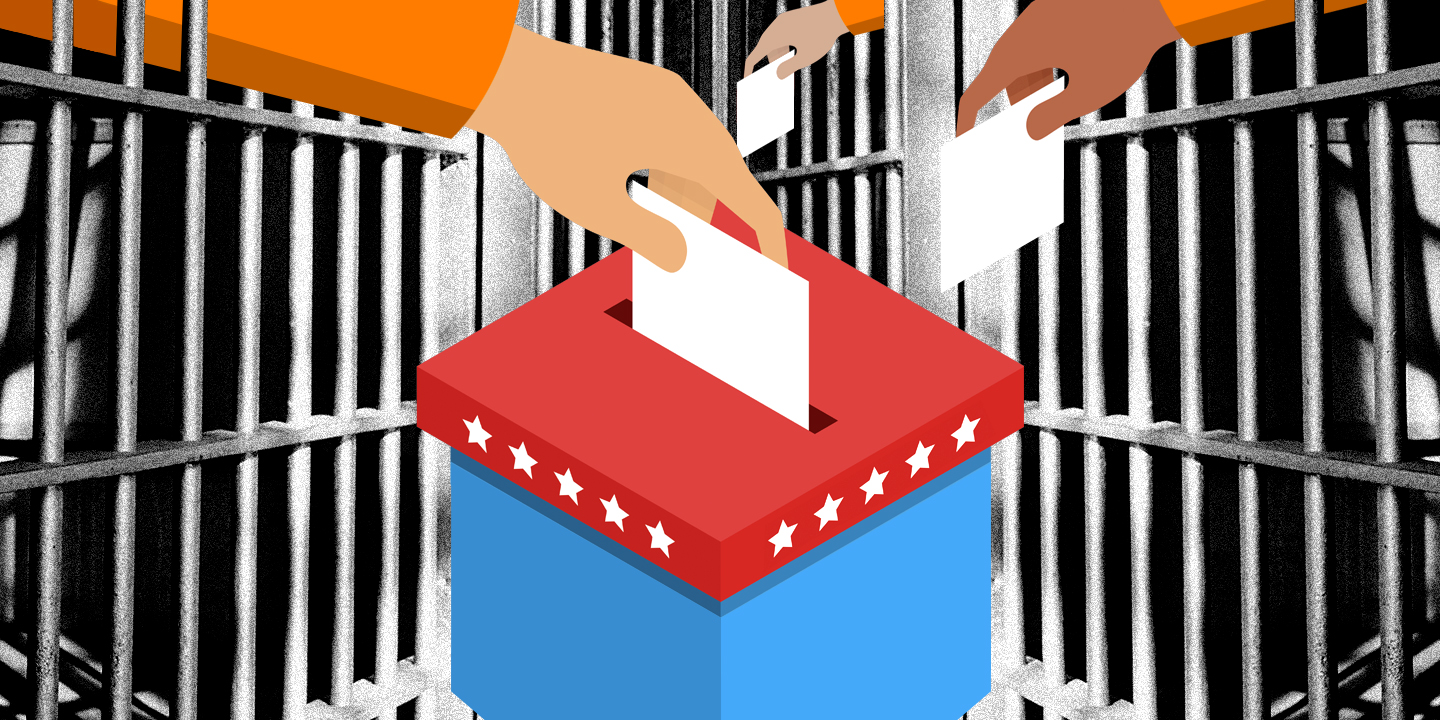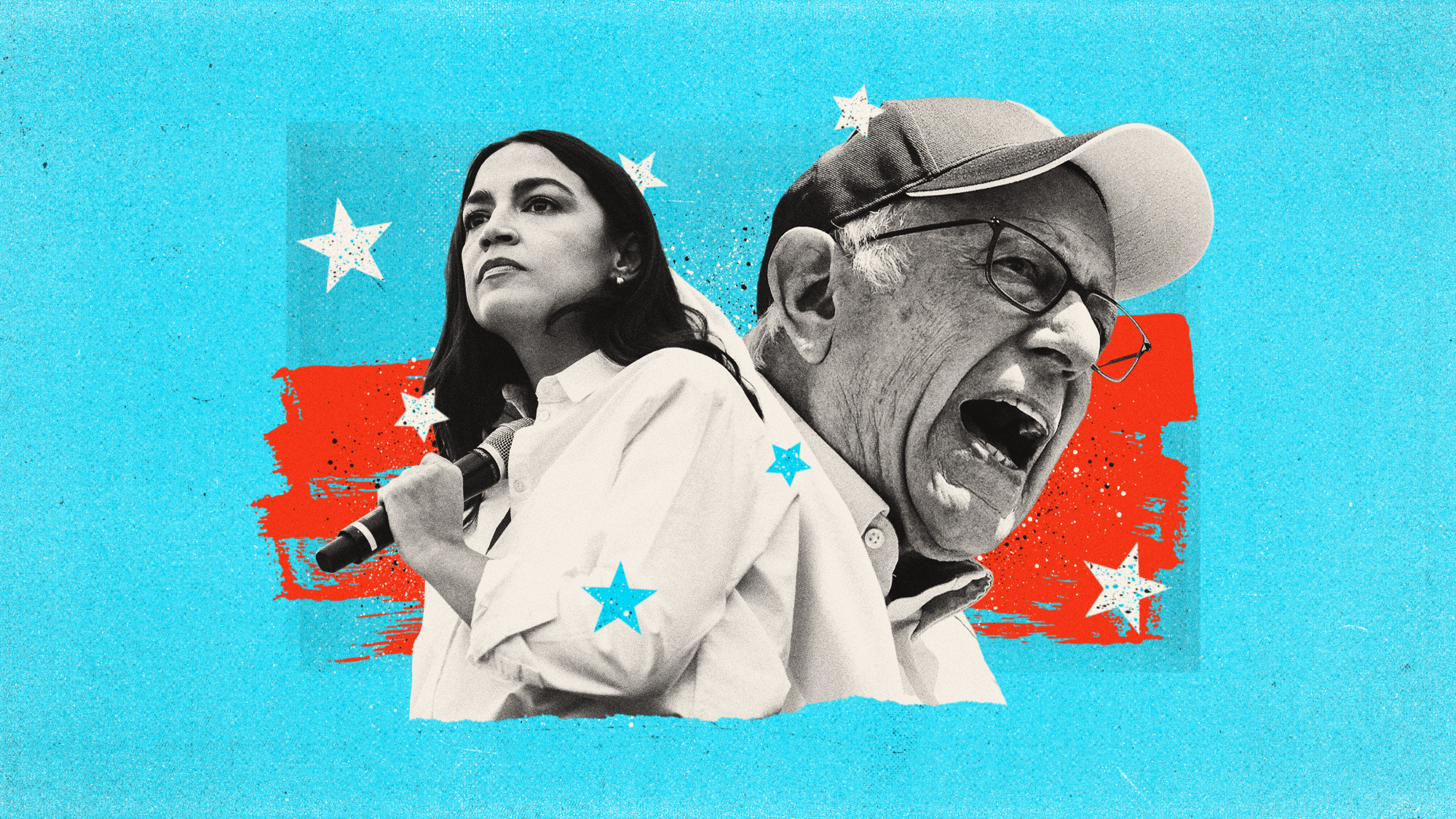Bernie Sanders is right: Let prisoners vote
Incarcerated people are still part of the democratic community


A free daily email with the biggest news stories of the day – and the best features from TheWeek.com
You are now subscribed
Your newsletter sign-up was successful
Bernie Sanders, perhaps pressed by Elizabeth Warren's flood of ambitious policy proposals, has a new idea: Let prisoners vote! This is an unpopular position — some 75 percent of Americans disagree, probably reflecting the fact that the idea has not come up much in debate. To the ordinary person, prisoner disenfranchisement sounds normal and fine.
It isn't. And Sanders is absolutely right — prisoners, like all Americans, should have an inalienable right to vote.
The case for the policy is straightforward: In a democracy, power and legitimacy derives from the consent of the governed, and prisoners are still subject to American government. Indeed, they are vastly more subject to direct state power than the average citizen. They ought to have a say in how that power is wielded even if they have committed a crime. Prisoners do not lose their constitutional rights — on the contrary, the Eighth Amendment protects them from excessive fines and cruel and unusual punishment.
The Week
Escape your echo chamber. Get the facts behind the news, plus analysis from multiple perspectives.

Sign up for The Week's Free Newsletters
From our morning news briefing to a weekly Good News Newsletter, get the best of The Week delivered directly to your inbox.
From our morning news briefing to a weekly Good News Newsletter, get the best of The Week delivered directly to your inbox.
In a true democracy, voting is really neither a right nor a privilege — it is a duty. The system only works because people feel they have a moral obligation to participate. Frankly, voting is kind of a chore, especially in the U.S., with our dysfunctional voting systems. And when one considers the fact that one single vote has virtually no chance of swinging any election, individuals have plenty of reason to stay home.
An ironclad right to vote extending to everyone also protects the franchise more broadly, which is a live concern.
Republicans have been pushing a straight-up anti-democratic agenda, trying to rig the electoral systems to give themselves an advantage. Republicans in Florida are gutting a duly-passed ballot initiative restoring voting rights to ex-cons who have served their time by requiring all ex-felons to also pay all fees and fines associated with their conviction before they can vote. Half a million Floridians could lose their voting rights. In Tennessee, the Republican state government attacked voter registration operations with a new law imposing fines of up to $10,000 on groups that turn in unfinished registration forms — "even though they’re required by state law to hand in any registration forms they collect." Texas is considering a bill to make it a felony to provide inaccurate information on a registration form, or vote when one is ineligible, even in cases of honest mistakes.
Democrats should push for an inalienable right to vote rather than playing along with the Republican game of parsing exactly who does and does not deserve suffrage. That just plays into Republican efforts to disenfranchise the Democratic base.
A free daily email with the biggest news stories of the day – and the best features from TheWeek.com
There is nothing to worry about on consequentialist grounds either. Vermont, Maine, and Puerto Rico all allow prison voting. There are 26 European countries that allow at least some prisoners to vote, and 18 of those do regardless of offense. None of those places are some Mad Max hellscape. Even if prisoners were to get behind some ridiculous "make murder legal" agenda, they are only a small fraction of the overall population — even in the U.S., where we have vastly more prisoners than any peer nation.
That huge prison population gets to the strongest argument for prison voting. The gigantic expansion of the prison population starting in the late 1960s was partly a response to a big spike in violent crime. But as Michelle Alexander writes in The New Jim Crow, it was also a backlash to the civil rights movement — a way to partially roll back the expansion of black civil rights. As of 2016, 26 percent of the black population was disenfranchised in Kentucky, 22 percent in Virginia, 21 percent in Florida, 21 percent in Tennessee, 17 percent in Wyoming, 16 percent in Mississippi, 15 percent in Alabama — and those are just the worst states. A maximalist voting rights agenda — restoring the franchise to ex-cons and prisoners alike — is, even more importantly than partisan political implications, a way to start pushing the civil rights ball forward again.
What's more, it's a way to start reorienting the American justice system away from vindictive punishment and warehousing of all social disorder, and towards rehabilitation and restitution — away from "an eye for an eye" and towards actually reducing crime. The vast majority of criminals will get out of prison someday; allowing them to vote is a powerful symbol that they are still part of American society. It could be the first step in returning education, libraries, and real paid work (as opposed to slavery) to prisons; managing them more humanely to reduce violence and exploitation; and drastically reducing the harshness of sentencing — while simultaneously creating a small constituency for such urgently-needed reforms.
As Fyodor Dostoevsky wrote, "The degree of civilization in a society can be judged by entering its prisons." Bernie Sanders should be commended for standing up on behalf of one of the most despised and maltreated people in American society.
Ryan Cooper is a national correspondent at TheWeek.com. His work has appeared in the Washington Monthly, The New Republic, and the Washington Post.
-
 James Van Der Beek obituary: fresh-faced Dawson’s Creek star
James Van Der Beek obituary: fresh-faced Dawson’s Creek starIn The Spotlight Van Der Beek fronted one of the most successful teen dramas of the 90s – but his Dawson fame proved a double-edged sword
-
 Is Andrew’s arrest the end for the monarchy?
Is Andrew’s arrest the end for the monarchy?Today's Big Question The King has distanced the Royal Family from his disgraced brother but a ‘fit of revolutionary disgust’ could still wipe them out
-
 Quiz of The Week: 14 – 20 February
Quiz of The Week: 14 – 20 FebruaryQuiz Have you been paying attention to The Week’s news?
-
 The billionaires’ wealth tax: a catastrophe for California?
The billionaires’ wealth tax: a catastrophe for California?Talking Point Peter Thiel and Larry Page preparing to change state residency
-
 Mamdani vows big changes as New York’s new mayor
Mamdani vows big changes as New York’s new mayorSpeed Read
-
 Bari Weiss’ ‘60 Minutes’ scandal is about more than one report
Bari Weiss’ ‘60 Minutes’ scandal is about more than one reportIN THE SPOTLIGHT By blocking an approved segment on a controversial prison holding US deportees in El Salvador, the editor-in-chief of CBS News has become the main story
-
 Has Zohran Mamdani shown the Democrats how to win again?
Has Zohran Mamdani shown the Democrats how to win again?Today’s Big Question New York City mayoral election touted as victory for left-wing populists but moderate centrist wins elsewhere present more complex path for Democratic Party
-
 Millions turn out for anti-Trump ‘No Kings’ rallies
Millions turn out for anti-Trump ‘No Kings’ ralliesSpeed Read An estimated 7 million people participated, 2 million more than at the first ‘No Kings’ protest in June
-
 Ghislaine Maxwell: angling for a Trump pardon
Ghislaine Maxwell: angling for a Trump pardonTalking Point Convicted sex trafficker's testimony could shed new light on president's links to Jeffrey Epstein
-
 The last words and final moments of 40 presidents
The last words and final moments of 40 presidentsThe Explainer Some are eloquent quotes worthy of the holders of the highest office in the nation, and others... aren't
-
 The anger fueling the Bernie Sanders and Alexandria Ocasio-Cortez barnstorming tour
The anger fueling the Bernie Sanders and Alexandria Ocasio-Cortez barnstorming tourTalking Points The duo is drawing big anti-Trump crowds in red states
